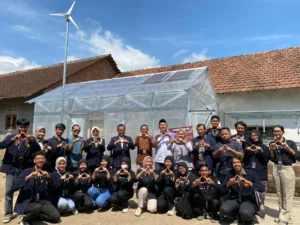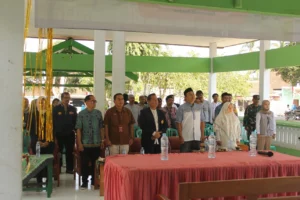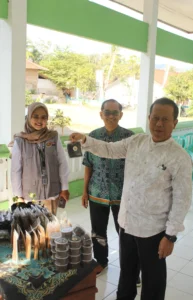 On Friday, August 23, 2024, the PPK Ormawa Himafi FMIPA Team of Jember University inaugurated a solar cell and windmill-based coffee dryer house in Pace Village, Silo District, Jember Regency. Several officials of Jember University were present. Vice Chancellor for Student Affairs and Alumni of University of Jember, Dean along with Vice Dean I and Vice Dean III of FMIPA UNEJ, Head of the Physics Department of FMIPA, Supervising Lecturers, and Coordinator of the Student Affairs and Alumni Working Group of UNEJ. Meanwhile, regional officials were present: Silo Sub-district Head, Pace Village Head, Babinsa and Bhabinkamtibmas, Head of Pace BUMDES, Farmers Group Association, Head of LMDH, Hamlet Head, Pace Village apparatus. Several KKN Collaboration students, and of course the entire PPK Ormawa UNEJ Team
On Friday, August 23, 2024, the PPK Ormawa Himafi FMIPA Team of Jember University inaugurated a solar cell and windmill-based coffee dryer house in Pace Village, Silo District, Jember Regency. Several officials of Jember University were present. Vice Chancellor for Student Affairs and Alumni of University of Jember, Dean along with Vice Dean I and Vice Dean III of FMIPA UNEJ, Head of the Physics Department of FMIPA, Supervising Lecturers, and Coordinator of the Student Affairs and Alumni Working Group of UNEJ. Meanwhile, regional officials were present: Silo Sub-district Head, Pace Village Head, Babinsa and Bhabinkamtibmas, Head of Pace BUMDES, Farmers Group Association, Head of LMDH, Hamlet Head, Pace Village apparatus. Several KKN Collaboration students, and of course the entire PPK Ormawa UNEJ Team
It began with a speech by the Supervising Lecturer of the PPK Ormawa HIMAFI Team, Nindha Ayu Berlianti, S.Pd., S.Si., M.Si, who reported on the implementation from the beginning of the program to the inauguration of the coffee drying house. This program is part of community service that not only focuses on increasing coffee productivity, but also on environmental sustainability. “We hope that this innovation can be a model for other regions in Indonesia that have the potential for coffee development, and can help farmers improve the quality of their harvest at a more efficient and environmentally friendly cost,” she said.
The next speech was delivered by the Head of Pace Village, Muhammad Farohan. “We hope that the Himafi student program will continue to run and develop so that many farmers are helped and can be useful, especially for Pace Village,” he hoped. Meanwhile, the Head of Silo District, Joni Pelita Kurniawansah, M.Si., emphasized the central government’s support for innovation in coffee processing and the importance of cooperation between the public and private sectors. “We strongly support this initiative, which is in line with the program to improve the quality of national agricultural products. Hopefully this facility will be a successful example for similar projects throughout Indonesia,” he said.
The Dean of FMIPA UNEJ, Prof. Drs. Dafik, M.Sc., Ph.D., gave high appreciation for the achievements of students who have succeeded in applying the knowledge they learned on campus into real practice. “We are very proud to see how our students not only understand the theory but also apply it effectively in society,” he said. Prof. Dafik gave an example of the successful implementation of a coffee drying house developed by students as one of the real results of their efforts. “This innovation not only improves the quality of the harvest but also has a positive impact on the welfare of farmer groups. This innovation is an extraordinary example of the synergy between academics and practice that supports the progress of local communities,” he continued.
In the opening ceremony of the coffee drying house, Vice Rector III for student affairs and alumni of Jember University, Dr. Fendi Setyawan S.H., M.H., gave an enthusiastic speech regarding the collaboration between coffee farmer groups and students. “Collaboration between us as policymakers and students is an important step in encouraging innovation and the development of creative ideas,” he explained. Vice Rector III of UNEJ emphasized how meaningful the contribution of students is in presenting innovative and relevant solutions. “We really appreciate the initiative and innovative ideas they bring. Support from the university for students to develop these ideas includes not only facilities but also guidance and valuable experience from professionals in the field,” he concluded.
This coffee drying house is supported by appropriate technology designed to work optimally in rural environments. Solar cell panels are used to capture solar energy, which is then converted into electricity, while windmills help circulate air during the drying process, ensuring that coffee beans dry evenly and faster. Farmers in Pace Village welcomed this innovation. They hope that with this coffee drying house, the quality of the coffee beans produced will increase, so that they can compete in the national and international markets. One of the coffee farmers stated that this project provides new hope for the future of coffee in the area. With this innovation, it is hoped that Pace Village can become a pioneer in the development of sustainable coffee while improving the welfare of local farmers through high-quality coffee products.


